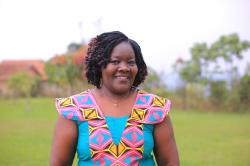Uganda recently launched the National Sexuality Education Framework 2018, which aims to provide formal, national direction for sex education within Uganda’s schools. While this framework demonstrates a step in the right direction at the policy level, social norms related to religious, traditional, and cultural values permeating Ugandan society pose challenges to the framework’s successful implementation.
Sex education is a controversial national debate, but the issue of adolescent sex education is a global discussion not unique to Uganda. The 1994 International Conference on Population and Development’s (ICPD) Program of Action calls on governments to provide sexuality education both in schools and at the community level that is age-appropriate, begins as early as possible, and fosters mature decisionmaking. The dilemma, though, is how quickly Ugandans will embrace this policy and ensure that girls can learn and be safe.
One 12-year-old’s story
During a girl’s club meeting in Mukura Secondary School in Uganda, I met a girl who I will call Sarah. She was 12 years old and had just begun her menstrual cycle. She thought she had contracted a terrible disease and did not know where to turn for help. Neither her mother nor her teachers had mentioned anything about this at home or in school. Her first confidant—her 14-year-old sister—said that something terrible had occurred and that “it’s a very private affair and a taboo no one should hear you speak about.” Sarah’s sister could not even mention the word menstruation and created a new word for it.
Sarah missed school while pretending to be sick. Her main problem, though, was that she had no menstrual hygiene products and relied on small pieces of rags as protection. She missed at least three days of school during each monthly cycle, and when she went to school with her period, she soiled her uniform, resulting in her peers—especially the boys—teasing her.
A study by SNV/IRC confirmed Sarah’s dilemma on a broader scale and found that about half of female pupils in Uganda will miss one to three days of primary school per month. This translates to a loss of between eight to 24 school days out of an average of 220 school days per year—or up to 11 percent of the school year.
Sarah’s story resonates with many girls in Uganda who get information on menstruation from peers. Due to religious and cultural values, sexuality and puberty issues are never discussed in the open. The information is often riddled with myths and misinformation and is insufficient for girls to manage their menstrual cycles. Girls become disillusioned and frustrated by their periods because they are left to fend for themselves.
To address these issues, girls need to receive sexuality and puberty education from teachers and learn skills that can help empower them. The International Technical Guidance on Sexuality Education highlights the importance of comprehensive sex education as a means of empowering youth to make informed decisions about their sexuality and relationships responsibly, which results in lower cases of HIV and AIDS, sexually transmitted infections, and unintended pregnancies.
Communities in Uganda will need time to adapt to openly communicating about sex with their children. The recent refusal of the clergy to embrace sex education is just one example of the cultural and religious barriers that this issue faces—contributing to delays in the Uganda Ministry of Education’s implementation of a sex education framework.
To start tackling this challenge, I am building on research I conducted at Brookings as an Echidna Global Scholar, alongside the Gender Unit at the Ministry of Education and FAWE Uganda, to equip teachers to serve as role models in schools. This is crucial for improving the lives of girls like Sarah. Having the policy framework in place will be key for strengthening and empowering teachers to be one of the main sources of accurate information on sexuality and puberty education for Uganda’s youth.



Commentary
Teachers can empower girls through sex education in Uganda
October 9, 2018